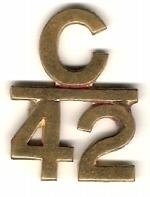11 November 1918 - Mons, Belgium
In the late hours of November 10th, 1918 the 42nd Battalion Royal Highlanders of Canada, 3rd Canadian Division, Canadian Expeditionary Force, liberated the town of Mons, Belgium ending four and a half years of German occupation. In 1914, Mons was the location of the first major encounter between the British Expeditionary Force and the much larger German Army.
As the sun rose on 11 November 1918, so did a new era as the 42nd Battalion Pipe Band played through the city into the Grande Place announcing to its citizens that they had been liberated. (see vintage footage)
 With the arrival of the Royal Highlanders of Canada into the Grande Place, just outside the Hotel de Ville, many citizens came out of hiding and rejoiced while some of the weary troops lay sleeping on the cobblestone oblivious to the noise and celebration.
With the arrival of the Royal Highlanders of Canada into the Grande Place, just outside the Hotel de Ville, many citizens came out of hiding and rejoiced while some of the weary troops lay sleeping on the cobblestone oblivious to the noise and celebration.
Two officers of the Royal Highlanders of Canada are credited with being the first British/Canadian troops to enter the Hotel de Ville when they ventured inside to set up Regimental Headquarters and restore telephone communications. When they did the city’s "Golden Book" was removed from the vault where it had been locked up since 1914 and presented to them and they became the first of many liberators to sign it.
The Pipe Band then lead the assembled troops down Rue de la Coup and Rue de la Grande Triperie eventually arriving at the Caserne d'Infanterie where they settled in for much needed rest and cleaning.
At 11:00am Brigadier-General J.A. Clarke, DSO, G.O.C., 7th CDN Inf Brigade received the keys to the City from the Mayor and the Pipe Band lead the formal march past of the Brigade in the Grande Place.
Later that same day at 3:30pm, Lieutenant-General Sir Arthur Currie, K.C.B., K.C.M.G., Canadian Corps Commander, rode into the City with his staff where he was greeted by the Mayor and assembled troops.
The 42nd Bn had its last 4 members killed in action while liberating Mons, and were buried after a civic funeral on 12 November in the Mons (Bergen) Communal Cemetery.
The Royal Highlanders of Canada lost 1,372 from the 13th Bn, 849 in the 42nd Bn and 282 in the 73rd Bn in the First World War.
The 13th, 42nd and 73rd Battalions, Royal Highlanders of Canada are perpetuated by The Black Watch (Royal Highland Regiment) of Canada, a reserve infantry regiment of the Canadian Armed Forces.

